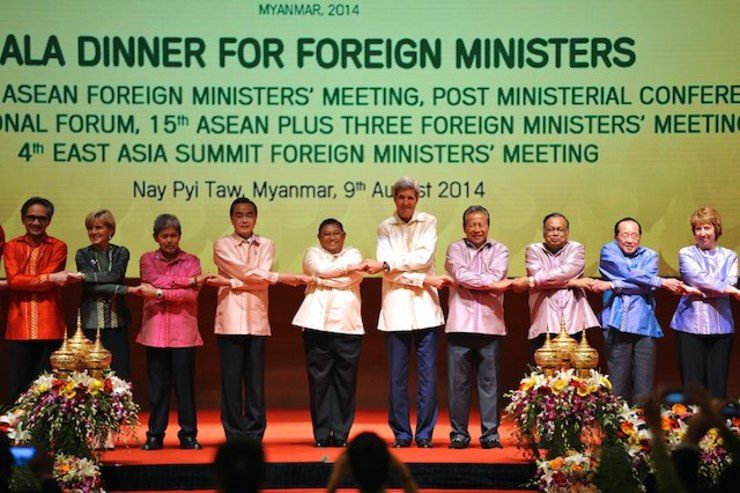SUMMARY
This is AI generated summarization, which may have errors. For context, always refer to the full article.

NAYPYIDAW, Myanmar (UPDATED) – The United States sought to ease maritime tensions as Asian and global powers gathered for security talks Sunday, August 10, but said that it did not want to “confront” China over its strategy in the region.
US Secretary of State John Kerry is pushing for an agreement to end all acts that risk further inflaming relations between Beijing and its Southeast Asian neighbors, following several tense encounters in the contested South China Sea this year.
Washington’s top diplomat is touring the region despite a slew of major international crises in other parts of the world as the US looks to reinvigorate alliances in the Asia-Pacific as part of President Barack Obama’s “pivot” east.
Observers say sea disputes will dominate the ASEAN Regional Forum in Myanmar’s capital Naypyidaw on Sunday, which brings together Southeast Asian foreign ministers and key partners, including the US, Australia, China, India, Japan, South Korea, Russia and the European Union.
While Washington is looking to reassure its Southeast Asian allies, officials insist there will not be a “showdown” between the two world superpowers.
“We don’t want to confront China. But we have a series of interests and principles that drive our approach in the region where they diverge with China,” a US administration official told reporters on Sunday.
Kerry on Saturday formally put forward Washington’s proposal to cool maritime tensions based on claimant states agreeing to step back from actions that could “complicate or escalate disputes”.
The US waded in to the South China Sea row following a series of maritime incidents between China and rival claimants, including Beijing’s positioning of an oil rig in waters also claimed by Vietnam.
‘Galvanizing’ role
China claims sovereignty over almost the entire sea, which lies on key shipping routes and is believed to be rich in mineral and oil deposits. (READ: China defends lighthouse building in South China Sea)
But its claims overlap with ASEAN states Brunei, Malaysia, the Philippines and Vietnam, as well as Taiwan.
US officials hailed American influence in ASEAN talks that began Friday, saying it had helped the bloc issue a united statement on the sea issue, which has previously seen friction between some member states with maritime claims and supporters of China.
“We think we have been successful in galvanizing and serving as a catalyst,” said a State Department official.
ASEAN said it was “seriously concerned” over the maritime disputes, in a statement by foreign ministers Sunday, that had been delayed as members wrangled over the language of the South China Sea section. (READ: PH seeks ASEAN support for S. China Sea action plan)
“We urged all parties concerned to exercise self-restraint and avoid actions which would complicate the situation and undermine peace, stability, and security,” it said.
North Korea issue
Ahead of the security forum Kerry seized the chance to reassure regional allies Japan and South Korea on US commitment on a range of other security concerns, particularly over nuclear-armed North Korea.
“We have a great deal to talk about with respect to the DPRK (Democratic People’s Republic of Korea) and the security issues in the region,” Kerry said in a meeting with his Japanese and South Korean counterparts on Sunday, after the sparring Asian neighbors held rare bilateral talks.
The US has called on Pyongyang to release two American citizens facing trial in North Korea and urged its nationals to avoid travel to the reclusive state.
Pyongyang has also sent its foreign minister Ri Su Yong to attend the Southeast Asian meetings.
But the festering South China Sea dispute is leading Sunday’s agenda.
While China says it is not the aggressor in the disputed waters, Chinese Foreign Minister Wang Yi on Saturday warned that “the Chinese side is bound to make clear and firm reactions” if provoked. (READ: Philippines’ ‘triple action plan’ futile without China?)
Wang held a bilateral meeting with his American counterpart on Saturday, August 9, which started awkwardly after late-running meetings meant Kerry kept Beijing’s top diplomat waiting for around half an hour.
In a statement released by the Chinese embassy in Myanmar following the talks, Beijing welcomed “the constructive role” played by the US in regional affairs, adding that it “hopes that the US can respect China’s legitimate rights and interests in this region”.
In May relations between China and Vietnam sank to their lowest point in decades after Beijing moved a deep-sea oil rig into disputed waters near the Paracel Islands, triggering deadly anti-China riots in Vietnam.
Beijing has since removed the rig, in a move that analysts say was aimed at deflecting accusations of aggression. – Rappler.com
Add a comment
How does this make you feel?
There are no comments yet. Add your comment to start the conversation.